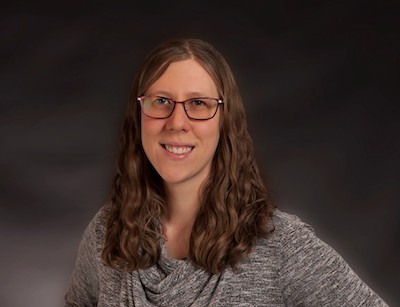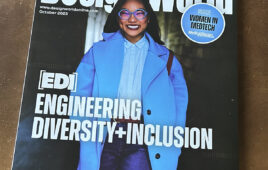Autumn Richardson, Senior Manager, IT–Platform Ops & Modernization, Digi-Key Electronics
BA Physics, 2010 Bemidji State University
BS Computer Science, 2010 Bemidji State University
Autumn Richardson is the senior manager, IT – platform ops & modernization, for Digi-Key Electronics, which is recognized as the global leader of the high service distribution of electronic components. Autumn is a strategic and passionate IT leader who enjoys developing solutions to interesting problems in innovative ways.
Autumn joined Digi-Key Electronics in 2009 as a software engineering intern and has since risen through the ranks to her current role, in which she improves the efficiency of modern software development and delivery through automation, tooling, patterns and solutions. Her previous positions with Digi-Key include software engineer on business systems development, team lead on core systems, manager of software test engineering, manager of IT development, and manager of IT tech ops.
Autumn earned bachelors’ degrees in physics and computer science from Bemidji State University in 2010. While still an undergraduate student, she completed an internship through NASA’s Planetary Geophysics and Geology Undergraduate Research Program and was invited to present her research at the 39th NASA Lunar and Planetary Science Conference in 2008.

Talk about the culture at your company. What makes it inclusive or supportive of women in engineering and automation?
Digi-Key has a large group of amazing women mentors and role models, who are very accessible. It’s cool to me that I am not the first female in the organization to shift from a software engineering role to a leadership position – I have others who have demonstrated that path before me, who I can look to for guidance and ask questions if I have them.
Digi-Key values its female leaders, and having those opportunities to see that leadership in action, along with the opportunities to learn new skills, explore other positions within the organization and take different approaches to challenges, creates a great culture for women.
Additionally, when I joined Digi-Key as an intern, I was immediately working on projects that had a direct contribution to the success of the business. I felt valued right away, knowing that I was a collaborator who had a voice in shaping the direction we were going, solving real-life problems and engaging with business partners.
Describe a recent company project (in which you were involved) that went particularly well. How did you and your team go about ensuring success?
I’m really passionate about continuous improvement and was offered an amazing opportunity a few years back to help our IT department transition to a more automated testing process.
Digi-Key had recently shifted its software engineering organization to an Agile approach – a faster-paced, highly iterative process that helps scale and develop features more quickly. In software development, each time you change any code, you need to test it to make sure it’s working properly, as well as doing regression testing to make sure that previous functionality is also still working properly.
At the time, our teams were still doing a large amount of manual testing, rather than automating that process. Many of the people in a testing role did not have a technical or software engineering background. We had one team attempting to automate tests for the entire department, and that team was at risk of being left behind, as it couldn’t keep up with the increasing rate of change.
I jumped at the chance to help that automation team transition into a program that could scale. I was able to empower the members of the team as automation experts and pair them with teams across the department to teach them the technical skills they needed to script and code automated testing. We built out a Center of Excellence and a Test Engineering career path, ultimately investing in programming skills and growing the partnership between testing and software development.
In the end, we were able to operate faster and more efficiently, and at the same time, that expertise was multiplied as many of these team members embraced the new career path. This incentivized learning approach allowed those in a testing role to not only learn new skills but also leverage critical thinking and problem solving while earning a new, more prestigious title in the process.
What first drew you to engineering and this industry?
I had some very good grade school education teachers as I was growing up, and many of the best science and math teachers I had happened to be female. In fact, I didn’t realize how male-dominated the STEM field was until college when I would often be the only woman in my class.
I love what I call the “infinite pit” of interesting phenomena that science represents – there is no end to what can be explored, studied and analyzed. I am a deeply curious person, and I really enjoy solving problems and puzzles.
What career advice would you give to your younger self?
I think a lot of young people, in high school or even throughout college, think that they need to pick a career that they’ll have for the rest of their life.
If you would have asked me in high school or college what I would be doing forever, I would have said studying planets. That couldn’t be further from what actually ended up happening, and I feel so much happier for it. Because I said yes to new opportunities, made some stressful decisions and took risks, I am in an entirely different career that is fulfilling.
I would tell myself to get to the root of what it is I enjoy doing: now, as some time has passed, I’ve realized that I really enjoy problem-solving. So, I’m able to find fulfillment in positions that allow me to flex that skill – the title and field are less important as long as I am solving problems.
What do you think can be done to promote greater participation of young women in engineering today?
I think it’s critical that we reach girls – and kids in general – at a younger age, to engage with them and expose them to STEM education. In particular, I wish computer science had a more prominent role in kindergarten through 12th-grade curriculum because it’s so accessible.
I also think that contextualizing science and math is really important – if you don’t know why something matters in the real world, or what it would be used for, you’re probably not going to care about it as much. We need to be showing them how a math problem applies to humans and/or nature. Why does it matter in real life? How does this apply to things we care about?
I was very lucky to have mentors and role models showing me what a career in science would look like, so I believe continuing to increase the visibility of women in STEM careers is vitally important for promoting greater participation among women.
Filed Under: Engineering Diversity & Inclusion




